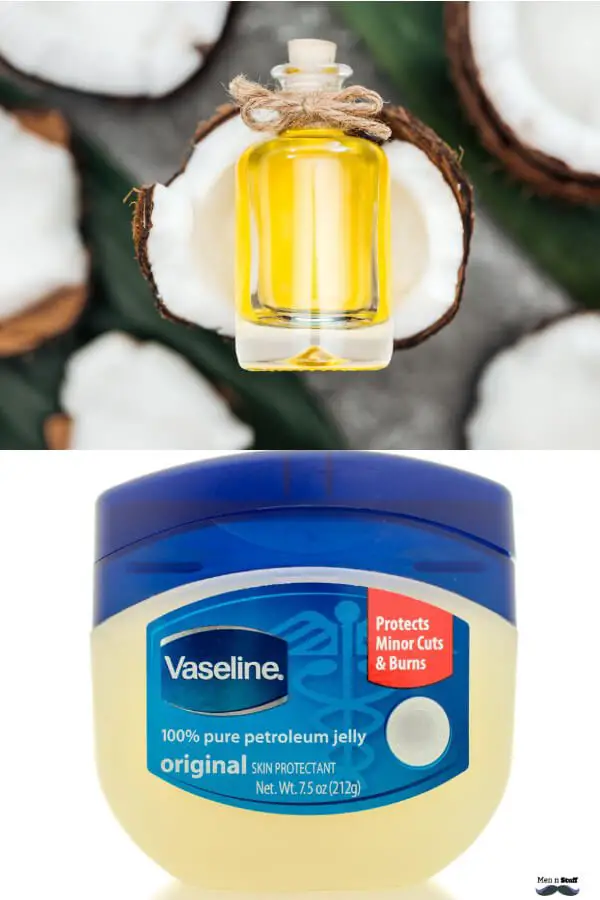Coconut oil and Vaseline are both effective for dry skin, but coconut oil contains natural antioxidants and fatty acids, making it an excellent moisturizer. Vaseline, a petroleum jelly, provides a protective barrier but lacks the added skin-nourishing benefits of coconut oil.

Coconut Oil VS Vaseline – Which Is Good For Dry Skin
1. Moisturization:
Coconut oil and Vaseline demonstrate excellent moisturizing properties.
- Coconut Oil: Rife with fatty acids, coconut oil works as a natural moisturizer that penetrates the skin better than other oils. It also has a pleasant smell that is preferred by many.
- Vaseline: With a petroleum jelly base, Vaseline forms a physical barrier on the skin to prevent moisture loss, thus effectively locking in the skin’s natural moisture.
2. Treatment of Dry Skin:
- Coconut Oil: Coconut oil is beneficial not only as a moisturizer but also for the treatment of skin conditions resulting from dry skin like eczema.
- Vaseline: Vaseline does an excellent job of preventing dry skin by reducing the evaporation of moisture from the skin surface.
3. Safety and Allergy Concerns:
- Coconut Oil: Generally, coconut oil is safe for the skin. Still, some people may have allergic reactions, causing redness or rash.
- Vaseline: Vaseline is hypoallergenic and non-comedogenic, meaning it won’t clog the pores. However, it may not be ideal for people with acne-prone skin.
4. Long-Lasting Effect:
- Coconut Oil: It offers long-lasting moisturization due to its high-fat content, but may require reapplication throughout the day, especially for excessively dry skin.
- Vaseline: Once applied, Vaseline provides a long duration of moisture lock-in due to its occlusive properties.
5. Absorption Rate:
- Coconut Oil: It is relatively quickly absorbed into the skin, providing immediate moisturization.
- Vaseline: Although it provides excellent moisture lock-in, it takes a little longer to soak into the skin.
In conclusion, both coconut oil and Vaseline demonstrate excellent properties for managing dry skin. The choice between the two depends on personal preference, skin type, and the specific needs of your skin. It’s always wise to test a product on a small area of your skin first to ensure it doesn’t cause any irritation or adverse reactions.
Composition Of Coconut Oil
Coconut oil is the natural extraction of dried coconut meat. It contains numerous vitamins and proteins, which are essential for your skin. If you have dry skin, especially on the legs, feet, and arms, you should try a moisturizer that contains lactic acid. Coconut oil is this kind of moisturizer. Besides lactic acid, coconut oil also contains –
1. Capric acid
2. Caprylic acid
3. Palmitic acid
4. Lauric acid
5. Stearic acid
6. Myristic acid
These constituents have a significant efficiency in restoring the moisture of the skin and keeping it nourished.
Why Is Vaseline Not Better Than Coconut Oil?
Vaseline is a brand of petroleum jelly. Petroleum is obtained from the oil refining process. To obtain pure petroleum jelly, carcinogenic and toxic materials must be removed. For safety, the manufacturer should refine it again and again. The purity of petroleum jelly may differ from company to company. So, if you use Vaseline from any company, make sure that the company is trustworthy.
Besides, petroleum jelly is not suitable for dry skin at all. It forms a thick, water-repellant layer over the skin to prevent moisture loss. Petroleum jelly does not add moisture to the skin. It just prohibits moisture loss from the skin.
Why Is Coconut Oil Better?
As coconut oil contains essential fatty acids such as lauric acid, myristic acid, and capric acid, they are absorbed entirely by the skin. They are also beneficial for the skin. They keep the skin healthier. These essential fatty acids penetrate the skin’s deepest layer, thus softening dry skin from the inside. Coconut oil also locks the skin’s moisture, but unlike Vaseline, it forms a thin layer over the skin, which allows the skin to breathe. If we compare coconut oil with Vaseline, we can see that coconut oil is better than Vaseline by many different parameters.
Differences Between Coconut Oil And Vaseline
If we compare coconut oil with Vaseline, we can see that coconut oil is better than Vaseline by different parameters.
| SL | Coconut Oil | Vaseline |
| 01. | Coconut oil is a natural extraction of processed coconut meat. | Petroleum is the main ingredient of Vaseline, which is a byproduct of refining oil. |
| 02. | Coconut oil is organic. | Vaseline comes from petroleum, which is inorganic. |
| 03. | Coconut oil adds a thin layer over the skin. | Vaseline adds a thick layer over the skin. |
| 04. | Coconut oil does not clog pores. | Vaseline tends to clog pores. |
| 05. | Coconut oil provides sun protection and prevents sunburn. | Vaseline may cause tanning. |
| 06. | Coconut oil is non-greasy. | Vaseline is thick and greasy. |
| 07. | Coconut oil does not contain any toxic ingredients. | Vaseline may contain toxic ingredients if not thoroughly purified. |
Benefits Of Coconut Oil
If you have flaky, dry skin, use coconut oil as a moisturizer. It will make your skin moisturized and soft. You will get a refreshed skin by applying coconut oil overnight. Some remarkable benefits of coconut oil include-
1. Hydration
Coconut oil adds a thin protective layer over the skin. Thus it entraps the moisture inside and keeps the skin hydrated.
2. Reduce Inflammation
Coconut oil has anti-inflammatory properties. So, it is beneficial for irritated, chafed skin.
3. Collagen Production
Coconut oil contains lauric acid. Lauric acid increases collagen production, which increases the elasticity of the skin. It also helps to lighten the dark spots.
4. Anti-Aging Properties
Coconut oil has anti-aging properties. Coconut oil produces collagen, which eliminates the formation of fine lines and wrinkles.
5. Lighten Dark Spots
Coconut oil can lighten the skin and reduce the appearance of dark spots. It also reduces uneven skin tone, improves your skin texture, and gives a radiant glow.
6. Cleansing Properties
Coconut oil acts as a deep facial cleanser. It wipes out dirt from the skin, and you can use it as a natural makeup remover.
7. Anti-Fungal Properties
Coconut oil has anti-fungal and antibacterial properties. It can retard bacterial growth.
8. Do Not Clog Pores
As coconut oil adds a thin layer over the skin, it does not clog your pores. It helps the skin to breathe, thus moisturizing the skin inside out.
Drawbacks Of Vaseline
Vaseline forms a thick barrier where it is applied. This barrier mainly locks the moisture, which can cause several problems. The main drawbacks of Vaseline are-
1. It Clogs Pores
Vaseline tends to clog the pores by adding a thick layer over your skin. As a result, your skin can not breathe.
2. Does Not Hydrate Your Skin
Vaseline only locks the moisture of the skin. It does not hydrate your skin and does not provide any water on its own.
3. Too Thick To Apply On The Face
Vaseline is so thick and bulky that you cannot use it daily. It makes a massive, thick barrier over your face.
4. Allergic Reaction
Some people get an allergic reaction by applying Vaseline over the face but this case is rare.
5. Acne And Breakouts
As Vaseline seals the skin, there is a chance of occurring acne and breakouts on the skin.
6. Slow Absorption
The top layer of your skin can absorb it very slowly. Vaseline takes a lot of time for absorption.
Safety Measures
Though coconut oil is an excellent choice for dry skin, you should take some safety measures while using it.
Use Pure Coconut Oil
Make sure the oil is certified organic, pure, and raw. If the oil is not entirely pure, it may harm your skin.
Extra Virgin Coconut Oil
Make sure your oil is extra virgin coconut oil before using it. Extra virgin coconut oil retains maximum efficacy.
Never Use It on Broken Skin
Discontinue using coconut oil if your skin is cut or broken. It may make the situation worse.
FAQs
1. Can I Use Coconut Oil On Oily Skin?
2. Can I Apply Coconut Oil On My Skin Overnight?
3. Can I Mix Coconut Oil With My Lotion?
4. Can I Use Vaseline On Broken Skin?
5. Can Coconut Oil Reduce Sunburn?
References:
https://www.healthshots.com/beauty/skin-care/coconut-oil-vs-petroleum-jelly-know-which-one-is-better-for-dry-skin/
https://www.newdirectionsaromatics.com/blog/articles/the-best-natural-alternatives-for-petroleum-jelly.html

